Through a conflicted prism, the effect of the year-long war in Gaza on the music and politics of Northern Ireland.
Belfast is 4,000 miles away from Gaza, but the empathy is strong. Almost every Saturday, a rally takes place in this small industrial seaport in the northeast of Ireland. Local people gather to show support, marching from Writer’s Square to the front gates of City Hall.
Often there is a speech by Sue Pentel from Jews for Palestine-Ireland, who calls out the latest fatalities and appalling news. Another regular is Mohammed Samaana, a native of Nablus in the West Bank, who has worked here as a nurse in the National Health Service for over 20 years. He represents the Irish Palestine Solidarity Campaign and he tries to voice his overwhelming sense of anguish.
Some of the events have been supported by Amnesty International and the union movement. They share many of the same features that you might see in London, Glasgow or Manchester. The call-and-response chants have been used for generations, notably against the war in Vietnam. The names of the political villains may have changed, but the war crimes persist.
Artists Against Genocide have made dozens of kite-shaped banners, inspired by the poem
“If I Must Die” by Palestinian writer poet and academic Refaat Alareer. He was killed by an Israeli airstrike in Gaza on December 7 last year, together with six members of his family.
As an antidote, the marchers sing “Bella Ciao,” the Italian song that has become an anti-fascist anthem. A more recent addition to the activist songbook has been adapted from a scene from the Hunger Games: Mockingjay film. It was rewritten by the online influencer Maryam Amaria for these fearful times:
Strange things are happening
The news is lying too
Are you, are you,
Following the truth?
Many of the Belfast supporters carry Palestinian flags or wear the keffiyeh. The watermelon graphic of red, white and green is a reminder that a nation can be cherished even when the flags and emblems are outlawed. It is something Irish nationalists understand.
Mothers Against Genocide is a powerful presence, walking with framed pictures of the dead children of Gaza. Some of the Irish women carry metal lids from old-fashioned dustbins. For generations, their families had rattled the lids on the roads at night to warn the neighborhood that a British army patrol had arrived.
Certain moments during the Saturday events are expressly Irish. Organizations like Cairde na Palaistíne Bhéal Feirste (Belfast Friends of Palestine) sing and chant in their preferred first language of Gaelic. One of the regular slogans is Ní saoirse go saoirse don Phalaistín — “there is no freedom until Palestine is free.”
Ireland has a huge reserve of defiant songs in its folk tradition and some of these have been roused for a new purpose. “Oró sé do Bheatha ’Bhaile” (Cheers, You’re Welcome Home) might date to the 18th century, or even further back. It was rewritten ahead of the Easter Rising of 1916, a call for Irish fighters to honor the past and rid themselves of the colonizers. The song has found a new use during the recent campaign for language rights and now it has become a song for Palestine. It has traveled as far as the college campus of George Washington University in Washington DC during the student occupations of April-May.
Several times, the marches have stopped outside Broadcasting House, home of BBC Northern Ireland. This is a chance for the speakers to rail against suspected media bias in news reporting. On January 20 this year, 120 demonstrators stood on the BBC steps, wearing replicas of the iconic blue press vests, marking the horrific toll of journalists, killed by IDF munitions or snipers.
Mustafa Osama is another regular face, a graduate of Cairo University who teaches the dabke dance tradition in his adopted city. He has brought a welcome relief to the Saturday gatherings, calling his students up for a demonstration of Levantine culture at City Hall, a time to clap and smile in a moment of communal joy. Then on June 15, Mustafa acted spontaneously, spinning and stomping by the fortified gates of the Caterpillar plant in West Belfast, dancing to affront the image of the company’s notorious D9 bulldozers that have ripped through so much of Gaza and the West Bank. This, we realized, was the rhythm of resistance.
Creative Belfast and Resistance
March 17 is Saint Patrick’s Day, when the island honors its patron saint. This is a traditionally a time for Irish political leaders to fly to Washington DC and exercise their green power, presenting gifts and Celtic blarney at the White House. Given that President Biden identifies as Irish and had visited his ancestral roots at Ballina in County Mayo in April 2023, this was especially opportune.
Yet the rising death toll in Gaza and the popular call for Boycott, Divestment and Sanctions turned the planned visit into a contentious one. Since America was supplying Israel with finances and armaments, was it morally justified to visit Washington with a bowl of shamrocks?
This question was forcefully raised by Bernadette Devlin McAliskey, addressing the National Demonstration for Palestine in Dublin, on January 13. Bernadette had been a formative civil rights activist in the 1960s — a powerful speaker who became the youngest Member of Parliament when she entered Westminster in 1969. She was a witness to Bloody Sunday in Derry in 1972, as British paratroopers killed 13 civilians (another victim died four months later). Parliament had denied her the chance to speak about the deaths to her constituency. Bernadette walked across the House of Commons and slapped the then Home Secretary Reginald Maudling in the face.
However, she was not denied the chance to speak about Palestine on her Dublin platform. She said she was outraged at the actions of the Israel Defense Force in Gaza. She lamented their many breaches of the United Nations Charter. Joe Biden, she reckoned, was “an enabler of genocide.” And then she delivered the memorable throwdown: “Who in their right mind, on the national day of a country that freed itself from oppression, would go to America and hand the bastard a bunch of feckin’ shamrocks?”
Stiofán Ó Luachráin from the music group Huartan was at the rally and witnessed Bernadette’s speech. He had spent a month in Palestine in 2017 and on his return, had joined every local campaign group, speaking and organizing. He was in a meeting of Irish Artists for Palestine after the Dublin speech when a friend suggested making a dance tune that featured the Bernadette quotes. This was exactly his thoughts. So, he put together the track in haste and then sought permission for the use of the quotes. He contacted Bernadette through mutual friends. The word came back. She liked it.
This became a release called “Fiáin,” a protest tune, based on a folk anthem, “The Foggy Dew” with those revolutionary sentiments of Easter 1916. Stiofán added electronic beats and cut-ups from Bernadette’s speech. A video was also patched together, summarizing the winter of marches and pro-Gaza energy. There was no time for slick edits or color grading, but this was the raw sense of creative Belfast and resistance: kites, drums, banners, diversity and dancing in the street.
The marchers began wearing badges with the image of a black shamrock, appalled that many of the Irish and Northern Irish leaders would not boycott the White House, that a “greenwashing” was under way for Biden’s benefit. Some of the smaller parties, the SDLP and People Before Profit, made their opposition clear. But Sinn Féin, the largest Republican party, with a revolutionary past, was insisting on a visit.
Michelle O’Neill, the leader of Sinn Féin in the north, stated her case on February 16, with TV presenter Patrick Kielty on The Late Late Show. “We will be in the States over Saint Patrick’s week … what we’re witnessing in Palestine is horrendous, it’s heartbreaking, it’s genocide and it needs to stop. And I will take every platform to go out and raise my voice and use my voice.”
On Saturday, March 16, a Shamrocks for Palestine rally traveled from Queen’s University to the American Consulate at Stranmillis, South Belfast. The mood was fraught. A Sinn Féin speaker Councillor, Clíodhna Nic Bhranair, was heckled and interrupted. The sense of solidarity was fractured.
Stiofán from Huartan remembers. “There was so much energy put into that boycott campaign and the whole movement was behind it. There was a huge sense of disappointment. All of the bad feeling that emerged from that, it damaged the movement. It’s just a shame that we didn’t win it. That was a tough day.”
Huartan uses their live shows to champion Irish language rights and to fight for environmental issues, such as the acute pollution in Lough Neagh, Ireland’s largest freshwater lake. They make repeated appeals for the Palestine people and remember the inspirational example of singer Sinead O’Connor, who supported BDS, wore the keffiyeh and spoke plainly. “There’s not a sane person on earth who in any way sanctions what the fuck the Israeli authorities are doing,” Sinead told Hot Press magazine in 2014, nine years before her death.
Huartan is completed with traditional players, Miadhachlughain O’Donnell and Catriona Ní Ghribín, plus two dancers, Anna Poloni and Mícheál Quiggley. They trigger the excitement of rave music and the resonances of folk to create “Tradtronica,” which is accented by masks and costume to summon a primeval Celtic spirit.
Catriona has studied music to Masters level at Queen’s University, sourcing, collecting and documenting old songs in her native Donegal. She realized that the patchy condition of the oral tradition had been worsened by colonial policy. The British had used penal laws in the 17th century to dismantle Catholic education, language and religious freedoms.
One of Catriona’s responses was to write a new song in Irish, called “Amhrán na Reábhlóide” (Song of the Revolution). She based the melody on an old hymn, “They’ll Know We Are Christians by Our Love” but this version pledges allegiance to Palestine:
Siúlfaimid uilig le chéile
Siúlfaimid lámh ar lámh…
(We will walk all together
We will walk hand in hand…)
A different action in each of the verses promises to stand, sing, rise and finally to fight, until Palestine is free.
“It came from the idea of trying to write a chant in the Irish language,” she says. “The idea was that it was a repetitive song, that people could remember it. It would be easy to pick up.”
https://www.instagram.com/catgrib_/reel/C8DG0g0MuPt/
Catriona brought her song to workshops with other players and singers in the traditional music community. She made a video of a performance and circulated this to other activists. Meantime the Cairde na Palaistíne group uploaded a digital songbook, including Catriona’s song, in preparation for the march to the Caterpillar industrial plant on June 15. She performed “Amhrán na Reábhlóide” at the meeting point in Dunville Park on the Falls Road and the followers sang it with her.
One of the special moments in Irish music culture is when a song travels into the tradition — becoming part of the shared memory bank, available to all. Some of the new lyrics in this very intense period of activism may eventually come to reside in this cultural store. Catriona hopes that “Amhrán na Reábhlóide” may find a home there.
“I want that to be the case — that it becomes some sort of folk song or a chant, for marches,” she told me.
A Little-known, Shared History
Ireland and Britain have a messy relationship that dates back to the 12th century and the Anglo-Norman invasion. A series of rebellions were brutally crushed. In 1916, Ireland’s Easter Rising might also have failed, but the British executed 16 of the leaders, causing a sympathetic public reaction that led to the War of Independence and ultimately, the creation of an independent nation. Soon after, India, Egypt and Burma were inspired to seek their own emancipation.
However, the compromise deal was a partitioned island, beginning in 1921. The 26 county Irish Free State ultimately extracted itself from Britain, becoming the Republic of Ireland in 1949. Meantime, the six county Northern Ireland was a smaller territory, mapped out to create a Protestant majority, partly the result of a settler plantation in the 17th century. This area is sometimes called Ulster, but the original province of Ulster was sheared of three counties to fit the new political plan.
This explains why some citizens from Northern Ireland, particularly Catholics, contest the names assigned to the six counties. They consider themselves as Irish, either nationalists or republicans. The more recent conflict in the north, 1968–98 was inflamed by such grievances. Calls for a united Ireland, completely outside of British dominion, are frequently aired.
When the maps of Ireland were being redrawn over a century ago, there were also plans for the future of British Mandate Palestine. Many of the discussions around the Balfour Agreement of 1917 were secretive. It was much later that Ronald Storrs, Britain’s Military Governor of Jerusalem (1917–26), published his memoirs Orientations (1937) with a stunning admission. The purpose of the Declaration and later decisions were intent on “forming for England ‘a little loyal Jewish Ulster’ in a sea of potentially hostile Arabism.”
Meantime, the British Palestine Gendarmerie (1922–1926) was staffed, at the behest of Secretary of State Winston Churchill, by hundreds of former armed enforcers who had fought against the natives in the Irish War of Independence — serving either as the Black and Tans or the Auxiliaries. Both groups, particularly the Black and Tans (nicknamed after their mis-matching uniforms) were hated in Ireland and their violent behavior in Palestine was also detested.
Therefore, the empathy between Ireland and Palestine is not accidental. It is history of shared grievances that is about land, identity and self-determination. This is certainly one side of the narrative. Conversely, the Unionists in the north who want to sustain their British links, may align with Israel. They celebrate the fact that Chaim Herzog, the sixth President of Israel, with born in Belfast, into a once-substantial Jewish community.
Unionists, particularly the Democratic Unionist Party (DUP), are active supporters of the Friends of Israel project. The Northern Ireland branch was endorsed by the former First Minister of Northern Ireland and DUP founder, Ian Paisley, in 2009.
Five years later, the Westminster parliament voted to back Palestine statehood, within the context of a two-state solution. There were 274 votes in favor. Of the 12 MPs who voted against, five were members of the DUP. One of these, Dr. William McCrea, a Free Presbyterian minister, was upfront about his support for Israel. “There’s a friendship there. We know what it’s like to be under attack for years on end. We fought terrorism here, from the republicans, so we know what it’s like to face these things.”
Steven Jaffe, the co-chair of the Northern Ireland Friends of Israel, gave an explanation to the Jewish News at the time. “Many DUP MPs come from a Bible-believing Protestant background. They have a very sincere and positive attitude to the Biblical roots of the Jewish people’s connection to the land. As well as sharing a book, unionists in Northern Ireland say they also share common experiences with Israel, given that both have waged a war against terrorism. So in political terms, they can relate to Israel’s position.”
Consequently, Belfast’s sectarian divisions are now marked out with their allegiances to a conflict 4,000 miles away. On the Falls Road, the murals and the flags are Palestinian. In loyalist Protestant working class areas like Sandy Row, the Star of David sways from the lamp posts.
Rebellion at a Cost
The music industry likes to sell the idea of rebellion, but it dislikes the real thing. Outspoken artists often discover that their careers have been choked and their voices muted. Yet the 12 upcoming Irish acts who were booked for a series of showcase events at the SXSW conference in Austin, Texas decided to remove themselves from the official program in March 2024. Most of them canceled at a great personal cost.
Belfast rappers Kneecap issued a statement on March 10: “We cannot in good conscience attend an arts festival that has ‘The US Army’ as a ‘Super Sponsor’ and is platforming RTX (formerly Raython), Collins Aerospace, and BAE Systems, the very companies selling the weapons that have murdered 31,000 Palestinians, over 21,000 of them women and children. This is 10 times the number of people killed in a 30-year war in the North of Ireland … in five months.”
This act has swerved between bad boy posturing and obstinate politics. Kneecap’s appearance on mainstream Irish television — The Late Late Show — gave them license to be bold. They told the audience they wanted to be loyal to the Irish language and they talked up a workers’ revolution. For much of the time, they spoke about Palestine and flouted the broadcaster’s protocol about badges and causes.
Four months later, their album, Fine Art, debuted at the top of the Irish charts. Their feature film, Kneecap, has taken $4 million at the box office, has been lauded at the Sundance Film Festival (NEXT Audience Award) and is nominated for an Academy Award. Critics of the act say their values are inconsistent, but video messages about Palestine have been a constant during their live performances.
Irish folk act Lankum was an early casualty of a censorious industry when a booking in Leipzig, Germany was pulled in November 2023. The TransCentury Festival issued a statement: “The Lankum and Gloria De Oliveira concerts tonight will not take place. Lankum represents a political stance that we as a venue and festival do not represent. In consultation with the artists, we have agreed to cancel the concert.”
As with Kneecap, the profile of Lankum has risen steadily. They are rarely bothered by industry obstacles. The Dublin act was a major draw at Glastonbury Festival on June 29, playing to a huge crowd as they revised a Irish folk tune, “The Rocks of Bawn” now landscaped in heartbreaking style as “The Rocks of Palestine.”
https://www.instagram.com/p/C81ovQvsDRy/
The Irish music community has rarely sounded more cohesive. Artists are organizing fundraisers, playing at rallies and writing important songs. One of the missing faces is Bono from U2, normally vocal about human rights issues in the Balkans, Latin America and Ireland. His silence is difficult to comprehend.
For some Belfast artists who experienced conflict in their own city, Palestine has prompted a life review, a step back into moments of dread and disbelief. A time to remember extreme violence and how personal reactions have been a measure of character and community resilience.
An Original Mind
David Holmes is a composer, producer and DJ. He has created soundtracks for directors like Steven Soderberg, Michael Winterbottom and Steve McQueen, plus the TV series Killing Eve. He has received two Ivor Novello Awards and a BAFTA. He spent a month in the West Bank in Palestine during his intense days as a club DJ in the 1990s, so his reflexes were already primed for this new development. And while he had spent many decades refusing to talk to journalists about his life during the conflict, now he was reliving his youth in Belfast, in a section of town that was territorial and edgy.
“I grew up on the Ormeau Road in the ‘70s, when the house was bombed and raided by the Brits, and you’re walking past serial killers every day. The minute I got to 18, the last thing I wanted to do was to address what was happening in Belfast. I’ve just seen an old interview in Jockey Slut (magazine) from the ‘90s. At the start of the interview, I say, I don’t want to talk about the Troubles. Now, as a 50-plus year-old man, I’ve had the time away from it.
“Every country that’s been colonized is the first to stand up with Palestine. Because they know what it’s like. Having grown up in the Troubles just brings us much closer to the Palestinian cause. I’m still learning about all this myself. I’m still learning about why I’m so passionate about it.”
David has externalized his thought process. He has made art from it, producing three vast audio mixes, hosted by the online radio station, NTS. He selects modern jazz, Arabic laments and haunting electronics. He samples conversations with intellectual figures like Gideon Levy, Norman Finklestein and Ilian Pappé. He thinks about the American civil rights movement and the trauma of Bloody Sunday in Derry. He makes revealing connections across resistance culture, calling up Angela Davis, Bernadette Devlin and a distressed nurse from Gaza.
“I’ve had people saying to me, you need to be careful,” David states. “And my answer is, I really don’t care. I cannot look away from this. Because, if I did, how would I go on and live my life? How can I look at myself in the mirror? And that’s been one of the most astounding realizations.”
This may be a comfort in distressing times. Music with a sense of action and agency. And many ears that care to listen.




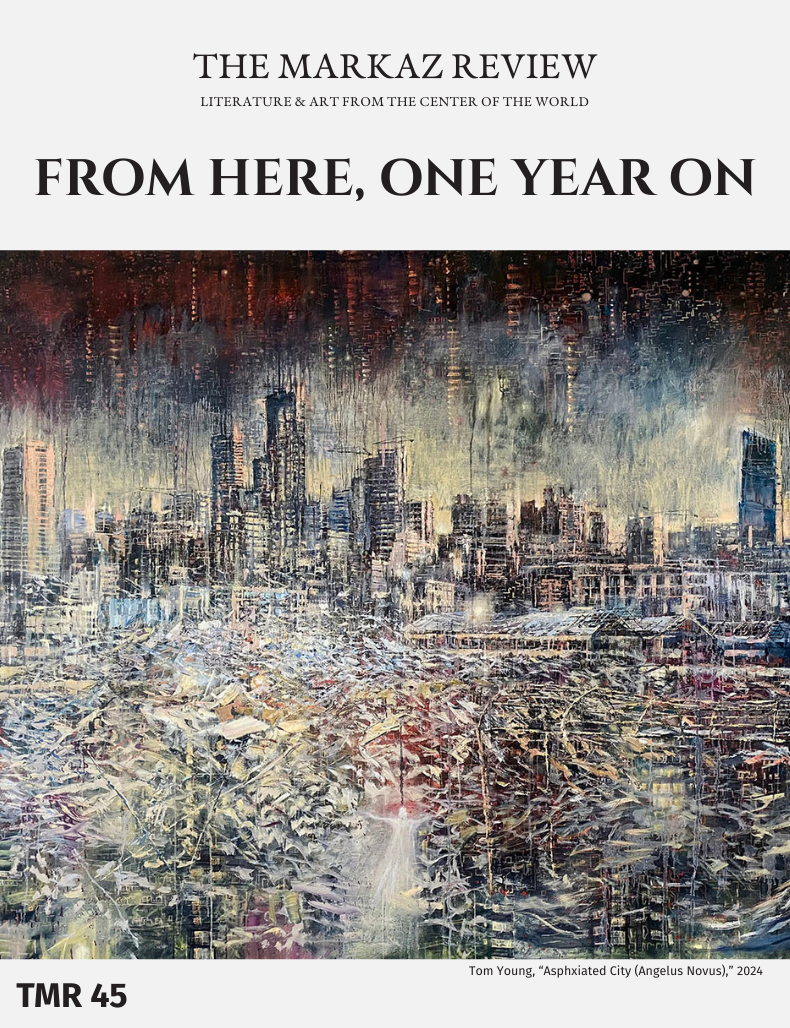
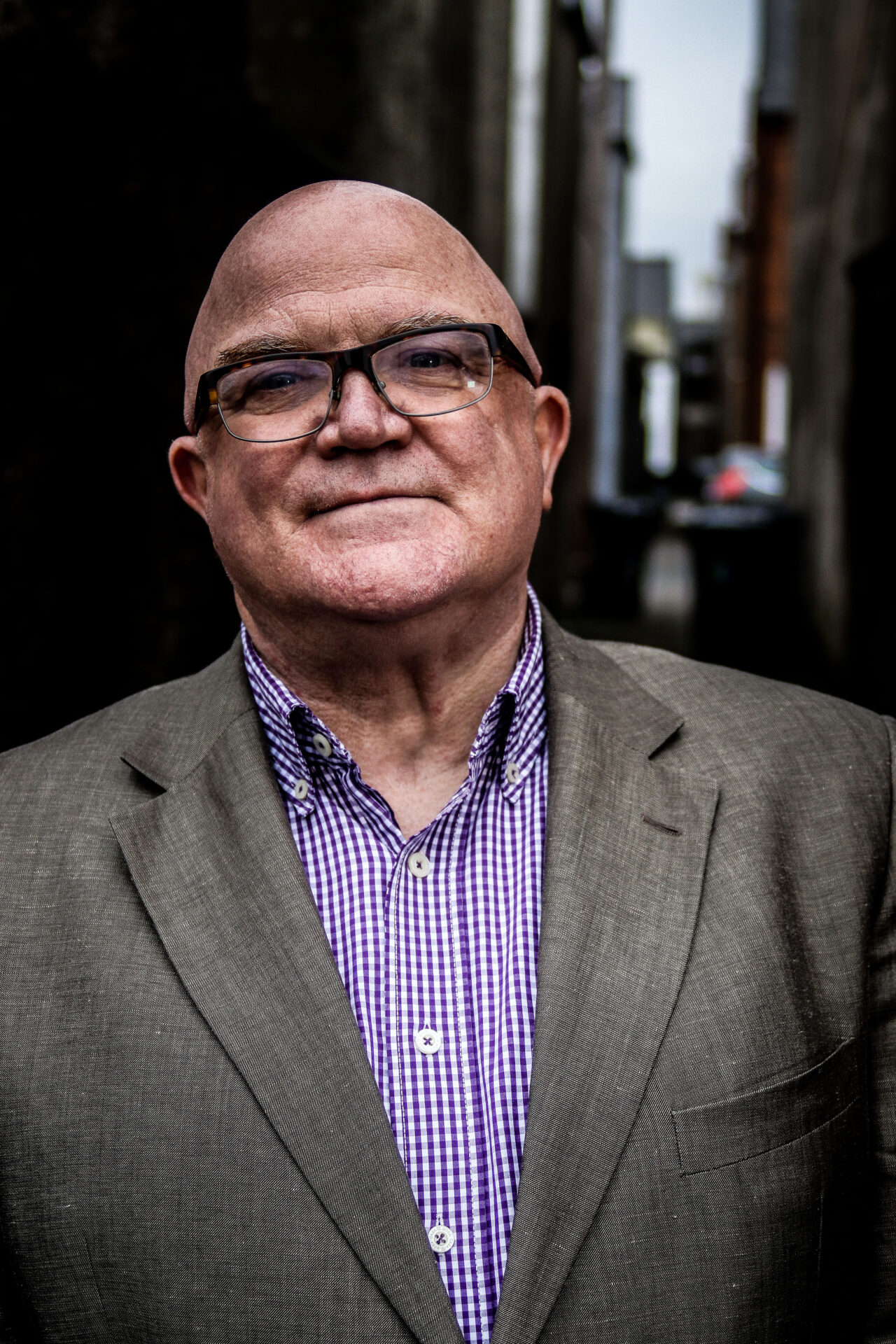




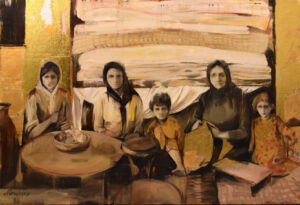


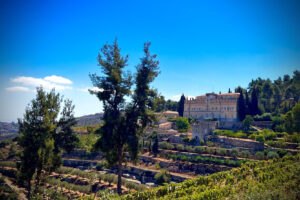



















































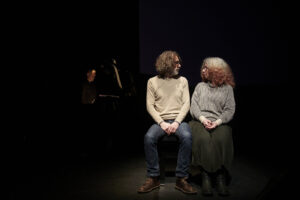































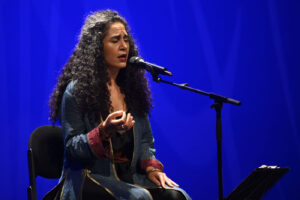



































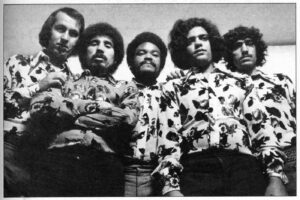

![Fady Joudah’s <em>[…]</em> Dares Us to Listen to Palestinian Words—and Silences](https://themarkaz.org/wp-content/uploads/2024/03/SAMAH-SHIHADI-DAIR-AL-QASSI-charcoal-on-paper-100x60-cm-2023-courtesy-Tabari-Artspace-300x180.jpg)





























































































































This compilation of linked stories of struggle against the injustices of the corrupt social order we live in is deeply moving, and deeply inspiring. I thank you for making it public, thereby publishing the commonality of all such struggles. Truly.
Thank you for this superlative article, this wonderful overview, by Mr. Bailie. My sensing is that Ireland (in general) is empathetic to the Palestinians as perhaps no other “western” country. The demented, complicit-plus war-criminal regime of my USA would be well to take a note…and to take action to end, forever, the insanity that has enveloped the militant/political Colonial Zionism monster that has its face its platform on ‘holy’ ground and is personified by its Prime Monster Netanyahu.